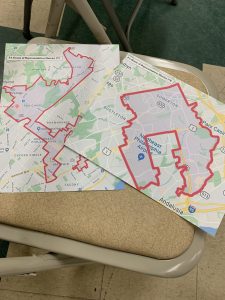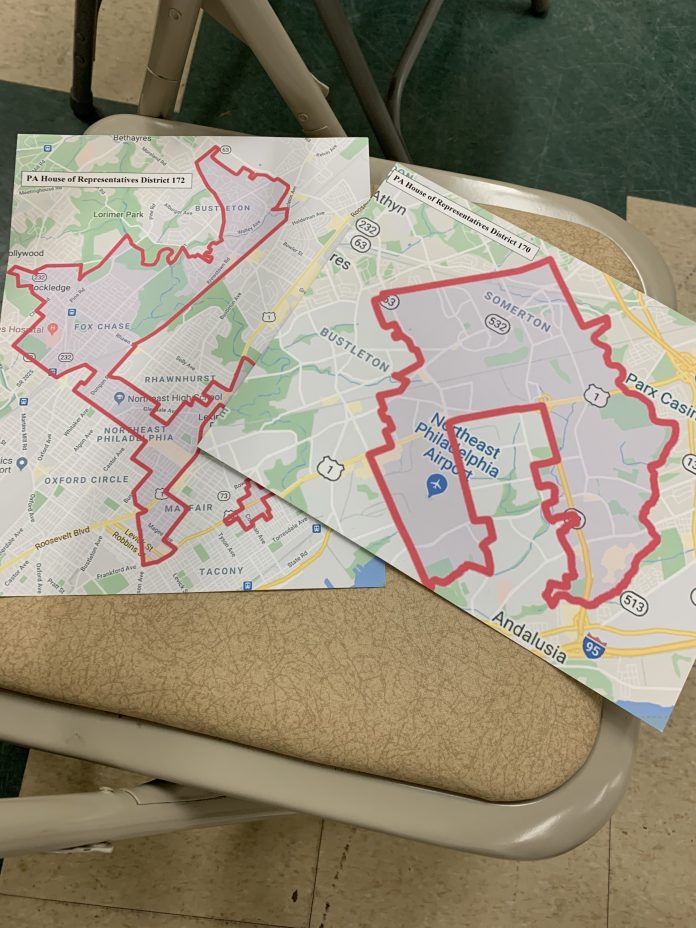Fair Districts PA last week held an informational meeting at Fox Chase Public Library to talk about gerrymandering – and how citizens can make a difference.
Fair Districts PA is a coalition that wants Pennsylvania to reform its redistricting rules to allow for fairer, more competitive elections by preventing gerrymandering. The organization hosts informational events in addition to reaching out to lawmakers and motivating the public to act. The organization is funded largely by small-donor donations in addition to a $25,000 grant from the Ben and Jerry’s Employment Foundation.
Richard Rafferty, a Northeast native and Fair Districts Montgomery County coordinator, recalled elections when the incumbent candidate ran unopposed due to the gerrymandering of their district. Gerrymandering is defined as dividing or arranging a territorial unit into election districts in a way that gives one political party an unfair advantage.
“I had no choice. The legislators and how they drew the maps chose me,” he said.
In 2018, the Pennsylvania Supreme Court ordered a redrawing of the state’s 18 congressional district maps due to being unconstitutionally gerrymandered. Fair Districts PA believes the legislative maps for state House and Senate are still unfairly drawn.
The Supreme Court decision will expire in 2021 and the district maps will be redrawn. FDPA hopes to change the players in the process to remove legislator conflict in redrawing the maps, and now is the ideal time to get citizens informed and motivated, Rafferty said.
FDPA wants to create an independent citizens commission to handle the drawing of congressional districts. House Bill 23, sponsored primarily by state Rep. Steve Samuelson, aims to establish an 11-person commission to oversee redistricting. The commission would be represented by four commissioners from each major party and three individuals not affiliated with either major party.
Under this bill, maps must comply with federal Voting Rights Act provisions and create compact and contiguous voting districts. If the commission deadlocks on what maps to vote for, elimination voting will be used to resolve the issue. Maps would have to be approved by votes of 7, with at least one yes vote from each party.
PA House Hill 22, sponsored primarily by Rep. Tom Murt, establishes the independent citizens commission as well, but the deadline is tight – it must get through two consecutive House sessions then go to voters in May 2021.
Both bills are part of FDPA’s “two bill, one commission” approach to shorten the timeline to put HB 23 in place after voters pass HB 22, since the commission will already be established when 22 passes.
In 2016, 92% of incumbents ran for re-election. A total of 87% ran unopposed in the primary, and nearly half ran unopposed in the general election. Figures were similar in 2018, with 92% of incumbents running for re-election, 86% of whom were unopposed in the primary and 37% of whom were unopposed in the general election.
“When you have the same parties and the same reps and senators cycling through every election, where’s the motivation to get stuff done in Harrisburg?” Rafferty said.
How does FDPA want people to get involved? By calling or writing your senator to support HB 22 or 23 or volunteering with the organization.
The same presentation will be given at Northeast Regional Library on Feb. 25 at 6:45 p.m.
To learn more, visit FairDistrictsPA.com or search the group on Facebook.





